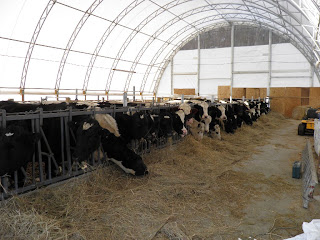
Friday, February 24, 2012
A quiet morning here on the mountain. The temperature started at 21° before daybreak and has moved up to 25.2° Not a whisper of wind this morning and the red skies I thought I would see remain the same gray from two hours ago. The Channel 3 weatherman, Gary, just said the storm is moving into southern Vermont now and this may turn into the first substantial storm we have seen here since before Thanksgiving. The barometer is at 29.32 and has started to drop.
An indicator of how bad the economy is seems to be seed and plant catalogs this year. Over recent years I have tried to let companies know that I use on-line catalogs and try to save trees. This year, however, I am receiving a number of catalogs I've never seen before and one of these is Irish Eye Garden Seeds from Ellensburg, Washington. This company sells organic seeds and also organic garlic and seed potatoes. I have mentioned an interest in potato varieties before and often you have to resort to the Internet to get some of varieties. I have also mentioned Peaslee's in Williamstown, VT, Johnny's Selected Seeds in Maine, and Jim Gerritson's Wood Prairie Farm, also in Maine. Locally I have had some luck at Guy's Farm and Yard, Agway, and also Depot Farm Supply in Essex.
The interest in fingerling type potatoes seems to be growing and I notice that the supermarkets are selling two pound bags of smaller potatoes for $4.95 which suggests the interest and willingness to pay remains steady.

With the availability of seed potatoes comes a good amount of info available in stores and on-line on how to grow potatoes. I think they are an easy crop to grow as long as you understand their nutritional needs, forget about the use of lime and have a contingency for critter involvement. Deer will eat the plants in summer and will dig the potatoes out in fall. Insects keep you busy in between but there are organic ways of dealing with them.
Here are images of Red Patriot, Russian Banana, All Blue and Yukon Gold to serve as example of what is available to try. There are dozens of other varieties too. While the snow deepens by nightfall today, give potatoes a thought for spring planting. If space is short at your house, try just a couple in a large container while you understand what plants look like and what typical production is by fall. It's a great project for kids but kids and adults alike find great fun pulling tops and finding out what grew all summer!

Yukon Gold
An indicator of how bad the economy is seems to be seed and plant catalogs this year. Over recent years I have tried to let companies know that I use on-line catalogs and try to save trees. This year, however, I am receiving a number of catalogs I've never seen before and one of these is Irish Eye Garden Seeds from Ellensburg, Washington. This company sells organic seeds and also organic garlic and seed potatoes. I have mentioned an interest in potato varieties before and often you have to resort to the Internet to get some of varieties. I have also mentioned Peaslee's in Williamstown, VT, Johnny's Selected Seeds in Maine, and Jim Gerritson's Wood Prairie Farm, also in Maine. Locally I have had some luck at Guy's Farm and Yard, Agway, and also Depot Farm Supply in Essex.
The interest in fingerling type potatoes seems to be growing and I notice that the supermarkets are selling two pound bags of smaller potatoes for $4.95 which suggests the interest and willingness to pay remains steady.

With the availability of seed potatoes comes a good amount of info available in stores and on-line on how to grow potatoes. I think they are an easy crop to grow as long as you understand their nutritional needs, forget about the use of lime and have a contingency for critter involvement. Deer will eat the plants in summer and will dig the potatoes out in fall. Insects keep you busy in between but there are organic ways of dealing with them.
Here are images of Red Patriot, Russian Banana, All Blue and Yukon Gold to serve as example of what is available to try. There are dozens of other varieties too. While the snow deepens by nightfall today, give potatoes a thought for spring planting. If space is short at your house, try just a couple in a large container while you understand what plants look like and what typical production is by fall. It's a great project for kids but kids and adults alike find great fun pulling tops and finding out what grew all summer!

Yukon Gold
Writing from the mountain above Peacham Pond where bluebirds yell at me for more food at the feeders even though they were fed at 6.
The picture of the little potato gardener up top is Alex when he was 10. He's 19 now and stands a head above me. Click on the pictures to enlarge them.
George Africa
The Vermont Gardener
Vermont Flower Farm
On Facebook at Vermont Flower Farm and Gardens and also George Africa
On Twitter at vtflowerfarm
Always ready to help you grow your green thumb!
The picture of the little potato gardener up top is Alex when he was 10. He's 19 now and stands a head above me. Click on the pictures to enlarge them.
George Africa
The Vermont Gardener
Vermont Flower Farm
On Facebook at Vermont Flower Farm and Gardens and also George Africa
On Twitter at vtflowerfarm
Always ready to help you grow your green thumb!












